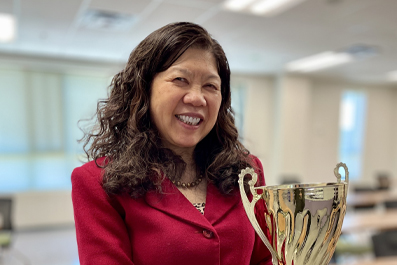In this week’s Friday Feature, Dali Tan, a native of Shenyang, China, discusses how her background has shaped her professional journey. Read on to learn how Professor Tan’s experiences have brought her full circle, and be sure to watch her Instagram Reel, too!

After beginning her career in China as an instructor of English, Professor Tan moved to the United States to study American literature. She earned her doctorate in comparative literature from the University of Maryland (UMD), College Park, and now teaches Chinese to NOVA Nighthawks!
This talented professor, beloved by her students and colleagues, is also well decorated, having received the Teacher Recognition Award from the U.S. Department of Education’s Presidential Scholars Program (2003), the Post-Secondary Teacher of the Year Award from the Foreign Language Association of Virginia (2021), and the Virginia World Language Teacher of the Year Award from the Southern Conference on Language Teaching (2022).
Professor Tan’s students are enrolled in her courses for many reasons. Some hope to achieve a more global perspective, while others want to master the basics of the Chinese language so they can more easily work in China. Now in her 12th year at NOVA, Professor Tan is a firm believer that learning a foreign language helps students be better prepared for their careers — and for their lives in general.
Tell us a little bit about yourself and your background.
I was born in Shenyang, in the northeastern part of China, and I have two younger sisters. Currently, I live in Northern Virginia with my husband. Our son works in San Francisco.
My inspiration to major in English came from my father’s and uncle’s stories, specifically about Americans they had met. I’ve always been fascinated by how people connect with each other. I developed a passion for interviewing and learning people’s stories, as well as how language connects us. That passion drove me to study English and American literature.
Having grown up in China, I wanted to learn English to better understand my family’s history. During World War II, an American priest played a pivotal role in saving my father’s life. After WWII, my uncle worked for an organization sponsored by the United Nations. When my uncle fell ill with tuberculosis, his American boss not only drove him to seek medical assistance but also generously covered the cost of his treatment. Amid fluctuating diplomatic relations between the U.S. and China, my uncle, determined to honor his commitment, eventually repaid the loan — even though his boss had long since forgotten about it.
Tell us how working with students has been impactful for you.
I had earned both my bachelor’s and my master’s degrees in China, and with many years of experience in language education, I seized an opportunity to teach Chinese in the United States. Eventually, I pursued my Ph.D. in comparative literature at UMD.
My teaching journey in the U.S. began at a private girls’ school, where I stayed for five years. After that, I transitioned to a private boys’ school, where I taught for 12 years. My enthusiasm for education eventually led me to a full-time position at NOVA in 2012. I was very excited to officially join the College — I can’t believe I’ve been here for 12 years! My focus is on empowering each student. Their appreciation and achievements make teaching the most rewarding and satisfying job in the world.
What kind of an impact do you want to have through your work?
The context of studying world languages, which used to be considered elective courses, has changed. Learning a language in school is now taken much more seriously. It’s fulfilling to see so many of my students discover the practical application of world languages: Learning a language can help students be more successful in other classes. It can expand their career prospects, too. And it can help them lead a fuller life!
In my perspective, a teacher’s success is defined by the achievements of her students. My colleagues at NOVA — deans, associate deans, provosts, campus and division staff, librarians, and many others — share this same commitment to our students. Such dedication and care makes for a wonderful working environment, and our students benefit from that.
Maintaining connections with my former students brings me immense joy. Bearing witness to their achievements — including studying abroad, securing scholarships, participating in experiential learning, and leveraging languages in their careers — is a real source of pride for me.
What’s something interesting you are working on?
I believe that students’ motivation increases when we connect what they’re learning to their passions and aspirations. I recently applied for a grant to cover the costs of such enriching experiences as field trips and honor society fees. Some of my students face financial constraints, and I don’t want them to forgo meaningful opportunities because of that. I also help my students connect virtually with students in China. Those connections make language learning so much more meaningful.
Currently, I’m collaborating with a student who is planning to enter a national Chinese music video competition. She is focused on improving her pronunciation so she can give a compelling vocal performance. That same student will soon be inducted into the National Collegiate Chinese Honor Society, a well-deserved recognition!